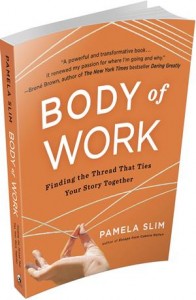Pamela Slim, the author of Escape From Cubicle Nation, just released an other book, Body of Work: Finding the Thread That Ties Your Story Together.
 She takes an interesting view on the fact that we actually create a Body of Work in our lifetimes, that ties together all our experiences – even if they do not seem connected. In hindsight, the sum of our experiences will make sense. Why not reinforce this meaning voluntarily from now on?
She takes an interesting view on the fact that we actually create a Body of Work in our lifetimes, that ties together all our experiences – even if they do not seem connected. In hindsight, the sum of our experiences will make sense. Why not reinforce this meaning voluntarily from now on?
Pamela writes: “Viewing your life as a body of work is not a short-term game. You want to focus on meaning, skill development, professional network development, craft and mastery. There is no one right answer for everyone.”
The book is full of examples of people that change radically their careers and lives and still find a way to bring everything back into their body of work – and expand it further, meaningfully, by opening themselves to new encounters and experiences.
You are in charge of creating your Body of Work. Take this responsibility and create this incredible story you will be able to tie up together in hindsight. Like we already mentioned in this blog, Life is Not about Finding Yourself, Life is about Creating Yourself!











